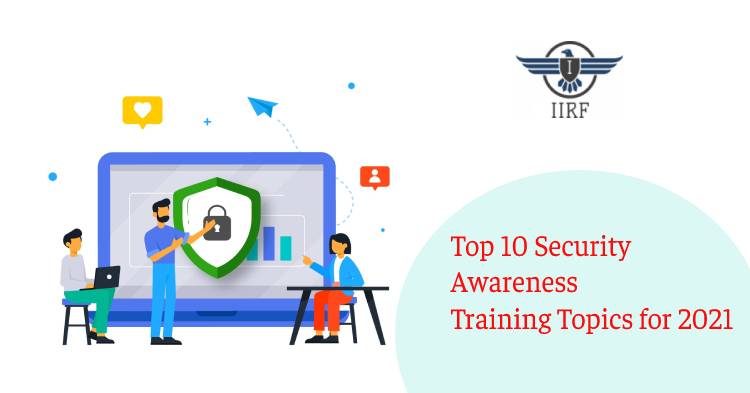May 16th, 2021
Top 10 Security Awareness Training Topics for 2021
With a digital world comes incredible power, but also a number of trade-offs. There was a 37% increase in cyber crimes across India in 2021, this number has only increased as work from home has become a reality, and people spend a majority of their time on the internet. When everything is digitised, it is alarming and worrisome that with a few taps the entire security system that protects your information can be breached. Therefore, it is important that employees and students are made aware of security awareness through training, here’s a list of the top ten topics that must be kept in mind:
1. Phishing Attacks/Social Engineering:
These are the most common forms of a security breach, and people fall for these very quickly. This comes in the form of text messages and phone calls. On a professional level, often called ‘spear phishing’ it could be an email from a higher authority, compelling you to put your password in, which is visible to the hacker.
2. Malware:
Malware translates to malicious software: these are suspicious attachments in e-mails, links to drive-by downloads and so on. The best way to be safe from them is to stay away from anything that looks fishy and keep an updated antivirus running.
3. Cloud Security:
Cloud is the saviour of all businesses, with the amount of data store on cloud, that can be accessed from anyone at any time is almost unbelievable. However, with such efficiency comes a higher risk of hacking. And there is a 90% chance that the problem is from the end-user. Therefore, it is imperative to know how to correctly and securely use Cloud.
4. Social Media:
Just like every other thing on this list, social media is just as much a threat as it is a blessing. All the information on social media is easily accessible to hackers and can be implored and used to harm you negatively Moreover, it is seen that people keep the same password for all accounts that they own. While this may be easy to remember, it also opens a portal of possibilities for potential hackers.
5. Removable Media:
Removable media consist of USB sticks, hard drives, SD cards and other such things we use on a regular basis. However, without the correct knowledge of safe removable media, we could be risking hacker access to all the files present on your computer. Oftentimes, these removable devices are home to malware and ransomware.
6. WiFi:
Today WiFi is almost next to breathing, with our large consumption of data everyday WiFi is everywhere. However, while it is a necessity, it is also necessary to know the amount of data that is being compromised with public and unsecured networks. In this case, we must know about VPNs, so that data is encrypted when being transferred over WiFi.
7. Mobile Device Security:
Mobile devices are another time-saving device. Compact and efficient they can be used to do work on the go. However, there are multiple malicious applications that can be installed in our smartphones. It is best to keep sensitive information on phones secured with a password. Moreover, it is important to teach people how to identify applications that could breach their security.
8. Locking Devices:
At the end of a long day it may seem tiresome and redundant to log out of your accounts, and your device. Especially if it is a device that only you have access to. However, take a minute to do these things, because an unlocked, unsecured device is the easiest access for hackers to install malware and steal data from.
9. Encryption:
Encryption is the threshold of a secure network. It hides information from unauthorized parties and allows the transfer of files and data from one network to another. It is important that all data stores are properly encrypted. The basics of encryption must be known by everyone.
10. Clean Desk:
As silly as it may seem, we often leave our passwords and usernames on sticky notes or important information and printed papers on desks and workspaces. Any potential thief or hacker will be quick to collect this information, and thus have all your data in his hands without even trying. A clean desk is thus imperative for a secure workspace. Also Read: Top Universities in India, Top B-Schools in India & Top Engineering Colleges in India
